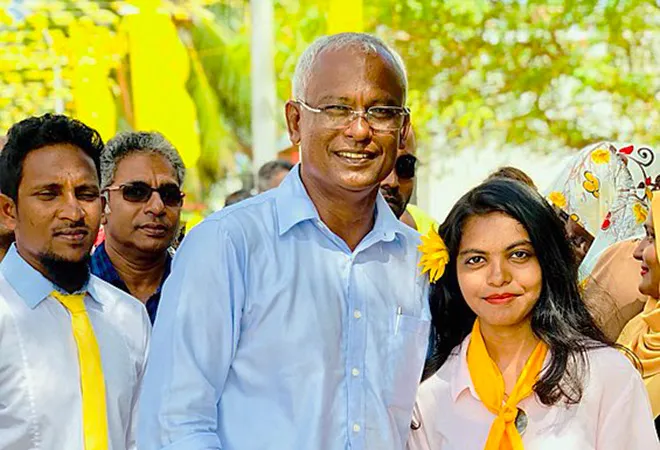-
CENTRES
Progammes & Centres
Location
Close to two dozen Maldivian nationals are believed to have died in Syria, fighting for the Islamic State.

The record victory of the Maldivian Democratic Party(MDP)-led joint opposition (JO) candidate, Ibrahim Mohamed Solih, or ‘Ibu’ Solih to friends and admirers, in the just-concluded presidential polls of Maldives, should please India’s strategic community as much as it does his party men, other pro-democracy activists, and nations across the world.
President-elect Solih’s plate is full with domestic political concerns of varying degrees. Starting with a smooth transition as in 2008 and 2013, he also needs to ensure that the coalition works smoothly. This can become possible only with the early and legitimised return of self-exiled leaders such as Mohamed Nasheed and Gasim Ibrahim, and the restoration of their civic rights, along with freedom for the likes of Maumoon Abdul Gayoom and religion-centric Adhaalath Party (AP) leader, Sheikh Imran, the other forgotten link in the Opposition quartet.
Solih’s presidency may end up taking the “international concerns” represented by nations like India, the US and the European (EU), on the security and China fronts, only in stages. His familiarly with international interlocutors and leaders has also been minimal, if at all.
China always ranks first in the Maldives-centred contemporary thinking of the Indian strategic community. However, India and Maldives should be concerned even more about the administrative flux that the transition entails for the latter, and the temptation for ‘Maldivian IS (Islamic State) returnees’ from Syria. Close to two dozen Maldivian nationals are believed to have died in Syria, fighting for the Islamic State, while another two dozen were expected to be there. As is known, IS has been losing ground faster in Syria and elsewhere, and the temptation for its cadres to return home may be high.
On China, and also Saudi Arabia, both of which were funding and backing Yameen’s development plans almost to the hilt, governments friendly to Maldives would have to find alternate sources to help the nation repay those massive loans, if only for Maldives to avoid the ‘debt trap’ of the neighbouring Sri Lankan kind.
At the same time, the experience of India and that of the West to the post-Rajapaksa regime developments on the China front in Sri Lanka, should be an eye-opener. During the early days of his campaign, Solih clarified that his presidency would continue ties with both China and Saudi Arabia. Then, and also in his acceptance speech in the wee hours of Tuesday, he reiterated this point.
On issues of religious fundamentalism, independent of what the MDP leadership may have projected about itself and the opponent of the day to the international community, things remain the same on the ground. Both during his campaign, and in his acceptance speech, Solih reassured Maldivians that the nation would remain ‘Islamic’, over which critics have often been targeting the Maldivian Democratic Party in general and Nasheed in particular, through the past decade, if not more.
India and the West can expect a Solih presidency to address their geostrategic security concerns in the shared Indian Ocean over China. A Solih presidency can be expected to be more transparent on this score than that of his predecessor, who continued to swear by India but without convincing anyone. More importantly, Indian concerns about Yameen’s call for the withdrawal of two military helicopters may become a thing of the past.
However, India expanding military ties with a new Maldives under a new leadership may need to be taken up with greater care and caution than in the past. If nothing else, the voting pattern of the 2018 elections needs to be closely studied for New Delhi to understand the composition of Yameen’s substantially high 42% vote share, if only to understand and accommodate their ‘Islamic’ and‘nationalist’ sentiments, if any.
This commentary originally appeared in Hindustan Times.
The views expressed above belong to the author(s). ORF research and analyses now available on Telegram! Click here to access our curated content — blogs, longforms and interviews.

N. Sathiya Moorthy is a policy analyst and commentator based in Chennai.
Read More +